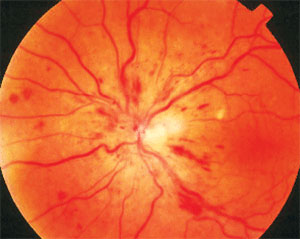 |
| Patients with CRVO on VEGF inhibition therapy have similar VA outcomes regardless of the drug type. Click image to enlarge. |
A common treatment protocol for patients with central retinal vein occlusion (CRVO) is regular injections of a VEGF inhibitor. Various agents—most often aflibercept, ranibizumab or bevacizumab—are used today to treat the condition, though it’s been shown that they don’t all have an identical clinical effect. For example, a recent study presented during the 2022 ARVO meeting in Denver found that the choice of VEGF inhibitor has an influence on central subfield thickness after three years. However, the researchers detected no difference in visual acuity outcomes between patients treated with each drug.
The retrospective analysis looked at 527 treatment-naïve patients with CRVO included in the Fight Retinal Blindness! registry. For the purpose of the study, outcomes of VEGF inhibition treatment—including central subfield thickness and change in visual acuity—were evaluated at 36 months, though many of the patients were treated for longer. The average age of patients was 71 years, and the average baseline visual acuity was 41 letters.
After three years of treatment with VEGF inhibition, the overall mean visual acuity improvement was 10 letters, aligning with the findings of previous studies. Visual acuity change did not differ between groups of patients receiving aflibercept, ranibizumab or bevacizumab. On the other hand, adjusted mean central subfield thickness change did vary by drug choice as follows: aflibercept (-310µm), ranibizumab (-258µm) and bevacizumab (-216µm). Patients who switched from one type of VEGF inhibitor to another gained roughly the same number of letters at 36 months as those treated with the same drug throughout the study period, even though the former group received more injections.
The data also revealed that slightly more than half of the patients still required treatment after three years (55%). The researchers concluded, “Two-line improvements in vision are typical with eye injections for CRVO. The choice of drug has little effect.”
Original abstract content © Association for Research in Vision and Ophthalmology 2022.
Hunt A, Nguyen V, Bhandari S, et al. 36-month outcomes of VEGF inhibitors for treatment-naïve central retinal vein occlusion: data from the Fight Retinal Blindness! registry. ARVO 2022 annual meeting. |

